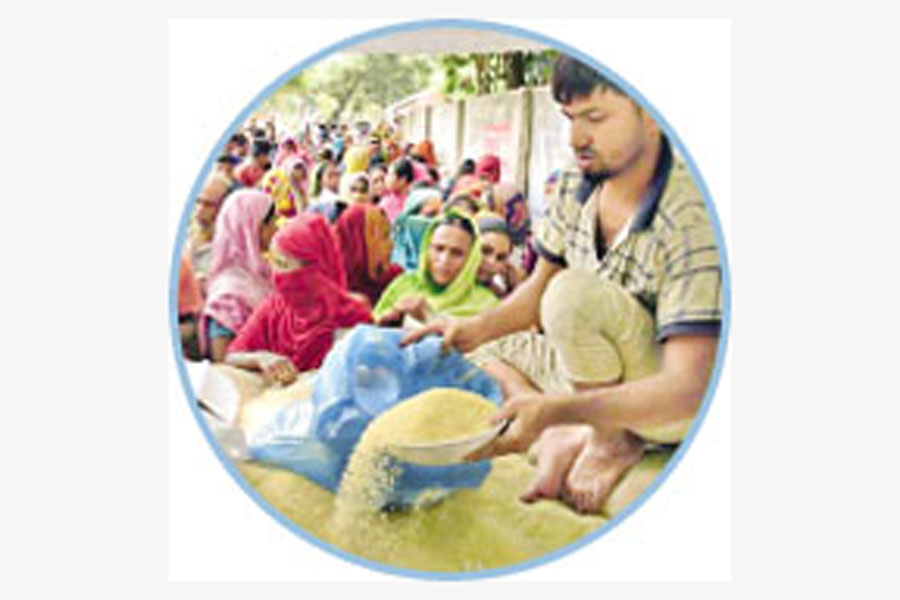
Published :
Updated :

It is quite unsettling to know that 41.7 million people in Bangladesh live in extreme poverty with 6.5 per cent of them in critical conditions. The findings by the United Nations Development Programme (UNDP) and the Oxford Poverty and Human Development Initiative (OPHI), the Oxford University, are part of the global Multidimensional Poverty Index (MPI) released recently. Their jointly prepared MPI report holds that worldwide 1.1 billion people live in acute poverty unsurprisingly with 40 per cent of them in countries encumbered with war and other kinds of strife including those not at peace with themselves.
Sadly, South Asia tipped not so long ago to be the growth hub of the world in the new millennium has been bracketed in this report with the Sub-Saharan Africa for intense and widespread poverty. South Asia is home to 272 million poor people and Sub-Saharan Africa's share in this undesirable record is 256 million. Within the South Asian region, the unmistakeable link between conflict and poverty is manifestly at work. But the equation has not been as axiomatic as the UN agency and its partner claim. For example, Sri Lanka was once ravaged by a civil war in the Jaffna peninsula but it did not halt its socio-economic progress pushing its people to poverty but it experienced severe economic reversals when no such conflict afflicted it apart from a mass uprising that forced the president to flee the country.
The Sri Lankan political changeover has been restaged in Bangladesh and the economy here is in the throes of a similar miasma. Sri Lanka which took a loan from Bangladesh to repay its foreign debt has ably managed the financial crisis and its inflation as measured by the year-on-year change in the Colombo Consumer Price Index (CCPI) decelerated sharply to 0.5 per cent in August 2024 from 2.4 per cent in July, its previous month. Surely, Bangladesh can learn a lesson from the South Asian island nation.
Yet not Sri Lanka but Bhutan can offer some of the most sought-after solutions to Bangladesh's problem. A country ---one that has witnessed one of the history's unprecedented mass uprisings with the rallying call for building a society free from discrimination--- with gaping inequality can learn how to reshape its social structure after the Bhutan model. Notably, in South Asia, the land-locked country with its modest national wealth can take pride in its least discriminated against society. Inequality is well managed in Bhutanese society.
However much desirable a transition to Bhutanese equalitarian economic order may fall in line with the non-discriminatory social aspiration here, national and international players espousing the free-market economy will never let it happen unless a movement or uprising of the August 5 order compels them.
Sri Lanka's plus point is its almost hundred per cent educated population on which score Bangladesh lags far behind. Suppose Bangladesh could bring down inflation anywhere near that country's level, would the extreme poverty take such a toll as it has done now on its people? Indeed, poverty is intrinsically linked here to inflation ---one that is triggered mostly artificially by the businesses. Even during the pandemic, 8,000 millionaires joined their peers numbered 13,339 by the end of 2018. Surprisingly, there was reportedly no millionaire in the country in 2010.
This gives an idea about the rate of wealth creation and the manner in which the process was fuelled. The much-hyped social safety network programme introduced was at best an eye-wash and at worst, the perpetuation of a vicious poverty trap with the privileged ensured of eating the cake and having it too. Bhutan could avoid this economic aberration because politics could maintain reasonable clarity free from abuse of power and corruption.
So, the promoters of anti-discriminatory social setups have overwhelming odds stacked against them to go about their stated business. They are busier making political decisions that could wait than devising the modalities for restructuring the socio-economic fabric. Back in time when the elected government took over in the new millennium, at which point there was no millionaire, the task would not prove so daunting. But now filthy and immoral wealth gain and laundering have made the exercise nearly impossible.
However, short-term measure such as plugging the avenues through which market manipulation is effected and medium- and long-term policy review for restructuring of the taxation system with far higher taxes on higher income can gradually address the socio-economic disparities. The range and scope of anti-discrimination campaign have to be outlined in clear terms for pursuance aimed at combating poverty and discrimination. Or else, this movement will peter out like the previous ones including the one against autocrat Ershad. Well, the interim government has constituted 10 commissions with the addition of four to the earlier six. Strangely, education has been left out which actually was a more deserving candidate than quite a number of those formed.
An educated nation can appreciate the democratic rights better and illiterate and not functionally educated people are prone to become a burden on society. Bangladesh perhaps has more beggars than a nation of this size should have. So, education in an era of digitisation and artificial intelligence, asked for prioritised consideration to make it up-to-date and appropriate for taking up the challenges of poverty alleviation and narrowing the gap between and among individuals, segments and classes of society.
nilratanhalder2000@yahoo.com


 For all latest news, follow The Financial Express Google News channel.
For all latest news, follow The Financial Express Google News channel.